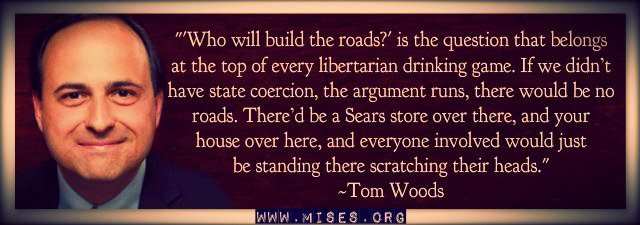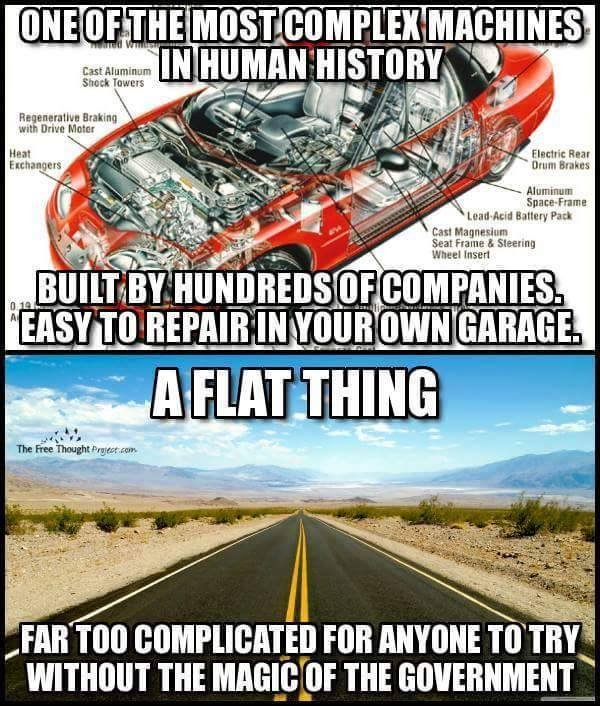But Who Would Build The Roads?
One of the most common responses given when a statist is confronted by an anarchist's rejection of government authority is, "But who would build the roads?"

Source: Someone else deconstructing this old chestnut
History
Yes, governments like to build roads to move armies, enhance tax collection, buy loyalty, and display their power, but this is not the source of roads. Governments like to "improve" preexisting trade routes to ensure that trade is properly taxed, but they only fed off the preexisting trade. they did not create it or the routes by which it traveled.
The most famous road in the world is probably the Silk Road, a series of trade routes spanning Asia. many empires built roads to guide this trade and ensure that a cut found its way into the coffers of the warlords and kings along its route, but if their demands were too high, the route could be changed. Traders didn't need the State, but the State needed the traders.
In the USA, the Cumberland Road was the first federal road project. It didn't blaze a trail through the wilderness though. It essentially rebuilt a preexisting military road that had in turn followed an ancient native American trail. The famous Oregon Trail emigrant route was developed entirely by fur traders and pioneers. The Interstate Highway System is the biggest argument for government control, but it was developed long after the Lincoln and Dixie highway networks s along with the rest of the Auto Trail system developed by private industry and the burgeoning automobile community. Major bridges and other massive construction projects have been built by private interests as well. One example with which this writer is personally familiar is the Bridge of the Gods on the Columbia River.

Source: Wikipedia
Funding
"But we would be plagued with tolls everywhere we want to go," insist the apologists for government monopoly. Yes, there was a toll on the Bridge of the Gods when it was a private interest. There is still a toll now after government assumed ownership. Many government highways charge tolls, and most "privatized" roads are merely crony corporations administering government roads. On top of this is the tax on every gallon of gasoline or highway diesel fuel sold, auto registration and licensing fees, and potentially any other tax-funded revenue streams used by various governments, all of which are funneled through a central bureaucracy. But private roads exist anyway, and most charge no toll. Businesses want customers and workers to be able to reach them, transportation to move goods, and commerce in general to function as seamlessly as possible. Any number of funding methods have been raised by writers at various times, and the example of the Auto Trail system even exists just a century in the past. Automobiles have become far more advanced over the decades. Why is it so hard to imagine that a flat surface to drive them over is so hard to improve, too?

Source: imgur
Conclusion
Stop making excuses for government, especially when history easily demonstrates how absurd an apology for its control really is. Understand that there are no magical exemptions for government when it comes to the waste and abuse inherent in monopolies. Look past the obvious benefits and explore the unseen costs of a popular policy. Don't assume that the status quo has any special weight in rational discussion.
What about stuff like the hadron collider etc? Basically high-tech stuff that may not yield any short-term gains, but quite necessary to explore the sciences that may yield long-term gains.
Why do you imagine that government funding is necessary for that? Scientific exploration has long been the domain of universities and industry without the need for any state support.
That's just the usual next question ;) - nice response
I am not sure you realize that Ancap replaces government with something like globalist. If you assume success in an Ancap scenario and iterate it forward a while, you will find that cooperative groups will out-compete individuals. Among cooperative groups, the more competitive ones will out compete the less competitive ones. Unless you borrow a divine power to enforce good will, you will have to rely on nature. In nature competition has productive and destructive components. The hyper competitiveness that the top competitors will tautologically display will employ the means available to them to compete - including destructive or deleterious attacking means.
Now, Ancap likes to say that members will be subject to a group enforced clause of doing no harm to others. Sounds nice. What it means is each person defines and interprets 'harm'. What that is to a hyper competitor, such as a brilliant individual, a sophisticated company, or an artificial super intelligence - is a game. It is a game where the rules are discovering and manipulating the definition of harm and willingness to act and the payoff matrix is a table summarizing the costs and gains of it.
I think that the 'freedom' idea that proponents of AnCap anticipate it delivering will be quite a different thing than the 'freedom' that they actually experience from it.
I think it is redundant for me to state that Anarcho-Capitalism is a simplistic conception that amounts to a wishful fantasy that uses imprecise ideas as a cosmetic to gloss over its many flaws. That being said, it has parts of ideas and goals that can be extracted and fit into better systems - so it shouldn't be discarded entirely.
muh freedoms!
I'm not sure I follow your line of argument. Are you saying that competition produces coercive monopolies, and that the principle of nonaggression guarantees aggression? If so, that doesn't make sense.
The argument is not that humanity is magically good, but rather that the market process rewards virtue while the government structure guarantees corruption and destruction. Production and plunder are mutually-exclusive. Productive profit only occurs through mutual benefit. Politics is the process of plunder through coercive force to gain profit at another's expense. Centralized power guarantees the latter. Decentralized services reward the former.
“Anarchists did not try to carry out genocide against the Armenians in Turkey; they did not deliberately starve millions of Ukrainians; they did not create a system of death camps to kill Jews, gypsies, and Slavs in Europe; they did not fire-bomb scores of large German and Japanese cities and drop nuclear bombs on two of them; they did not carry out a ‘Great Leap Forward’ that killed scores of millions of Chinese; they did not attempt to kill everybody with any appreciable education in Cambodia; they did not launch one aggressive war after another; they did not implement trade sanctions that killed perhaps 500,000 Iraqi children. In debates between anarchists and statists, the burden of proof clearly should rest on those who place their trust in the state. Anarchy’s mayhem is wholly conjectural; the state’s mayhem is undeniably, factually horrendous.”
"Anarchism is not a romantic fable but the hardheaded realization, based on five thousand years of experience, that we cannot entrust the management of our lives to kings, priests, politicians, generals, & county commissioners."
"Anarchy is no guarantee that some people won't kill, injure, kidnap, defraud, or steal from others. Government is a guarantee that some will."
ok.
Well, I live in Honduras and the government has been trying to privatize nearly all government owned companies, and they don't work well under private enterprise either, so I personally think both government and private owned companies aren't going after anyone's interest but their own.
Example, airports, they've been privatized for a long time and we happen to have the worst airports in Central America.
So in the end the working people are always screwed anyway you go, regardless of political system or whatever.
"Privatize"
Either they are giving government monopoly power to cronies, or government is trying to prop up an unsustainable model for services that need to be free to completely realign with market demand. I'd bet Steem that this has nothing whatsoever with actually allowing a free market to function, and the alleged "collapse" is government failure at its core.
No they are "sold" to the wealthy elites, as happens everywhere.
So, solving the problems of political plunder through more political plunder, the exact opposite of the market process.
That's exactly the problem, who owns the market?
No one owns the market. The market is the umbrella term for the effect of people engaging in voluntary associations and exchanges and the attendant property right uses and transfers.
EDIT Government is a group of people who operate through trespassing against the rights of others through coercive force using the mythology of State legitimacy. the concepts of government and market are antithetical, and government intervention in the market is always destructive and parasitic.
a big problem in LatAm is that privatization is really just granting privileged concessions to elites. Even with a privatized firm, you still have a ton of barriers to competition from both abroad and new potential ventures domestically. Even the bureaucracies inhibit competition and favor well-connected and wealthy cronies.
Nonetheless, good point in that privatization isn't a be-all end-all solution to all of the worlds problems. Freedom, transparency, and safeguards to property rights are better objectives than privatization ...they'll result in privatization, but in a healthier environment.